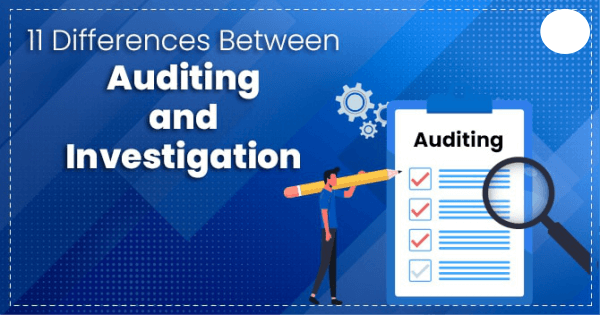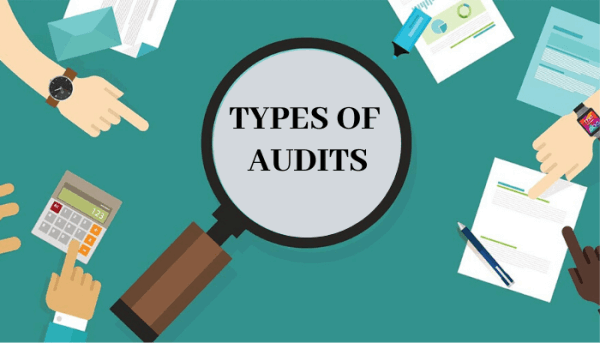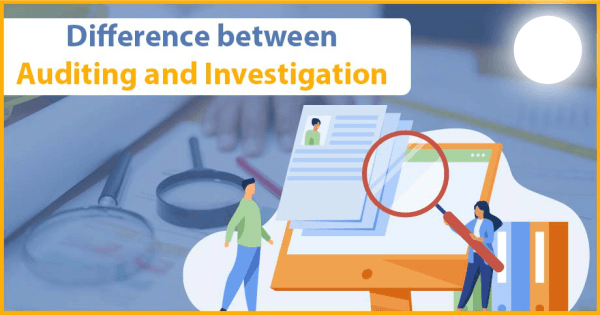Difference Between Auditing and InvestigationIn general, auditing is done to determine how accurate and fair the financial records of a business are, whereas an investigation is done to establish a particular fact. The Standards on Auditing serve as the foundation for the Audit's scope, whereas the conditions of engagement serve as the foundation for the investigation's scope. People frequently mix these two concepts owing to a need for more awareness and information, which is to be expected. 
Both "auditing" and "investigation" are commonly used in the accounting field and refer to methodically looking at facts. Despite the fact that these expressions have anything to do with the analysis of data, their definitions and meanings are different. Therefore they cannot be used interchangeably. Audit and inquiry refer to two distinct ideas or ways of looking at data in accounting; nevertheless, they differ in scope, methodology, purposes, and subject matter. What is Auditing?Financial statement audits, or an unbiased review and assessment of a company's financial statements, are commonly referred to as audits. An outside third party normally carries out these tasks. 
Internal auditors and government organizations like the Internal Revenue Service can conduct audits (IRS). Types of Auditing
1. Internal AuditCompanies conduct internal audits. The Audit is started by you as the company owner and carried out by someone else. Internal audits are a good approach for companies with shareholders or board members to keep them informed about the company's financial health. Internal audits are also a useful tool for keeping tabs on financial objectives. 2. External AuditA third party, such as a tax agency, the IRS, or a certified public accountant, performs an external audit. There is no relationship between your company and the outside auditor (e.g., not an employee). Moreover, external auditors must adhere to commonly recognized auditing standards (GAAS). An external audit's primary goal, like internal audits', is to evaluate the correctness of accounting records. To guarantee that the financial data and information provided by the company are true and fair, investors and lenders frequently want external audits. 3. IRS Tax AuditIRS tax audits are used to judge whether the tax returns that your business has submitted are accurate. Auditors check your company's tax liabilities for inconsistencies to ensure that your firm did not overpay or underpay taxes. Also, tax auditors look through potential problems on your small company tax return. The IRS is often audited at random by auditors. IRS may be carried out via mail or in-person interviews. 4. Financial AuditOne of the most popular types of Audit is a financial audit. The majority of financial audit types are external. The auditor examines the fairness and correctness of the financial accounts of a company during a financial audit. A financial audit is carried out by auditors who look at transactions, processes, and balances. Following the Audit, the third party often issues an audit opinion regarding your company to creditors, lenders, and investors. 5. Operational AuditAnalogous to internal audits, operational audits are conducted. The objectives, planning processes, operational procedures, and outcomes of your business are all examined during an operational audit. In most cases, internal audits of operations are performed. Operational audits, however, can be done by other parties. A thorough assessment of your company's operations and identifying areas for improvement are the two main objectives of an operational audit. 6. Compliance AuditTo determine if your company's policies and practices adhere to internal or external standards, a compliance audit looks at them. The results of a compliance audit can be used to assess if your company is in compliance with laws governing the payment of dividends to shareholders or workers' compensation. They may also assist in determining if your company is in compliance with IRS rules. What is Investigation ?An investigation is a formally sanctioned effort to gather information about a complicated or secret matter in a systematic, minute, and exhaustive way. The study of the evidence in order to inform criminal procedures is a necessary component of criminal investigation, which is an applied science. A comprehensive criminal investigation may involve searching, speaking with witnesses, questioning suspects, obtaining and preserving evidence, and doing several other types of inquiry. 
In current criminal investigations, several modern scientific methods?commonly referred to as "forensic science"?are frequently applied. One of the earliest professionals identified as criminal investigators was an English constable. An investigation aims to compile information that may be used to support or refute claims of fraud and corruption. It is a legally required fact-finding procedure that is carried out objectively and impartially to identify the pertinent facts and formulate suggestions in this respect. As a result, an inquiry is a methodical, meticulous, and thorough endeavor to gather information about something complicated or secret formally and officially. The scientific method is a process of inquiry or problem-solving that is at the core of the sciences. The basic phases of the scientific process are as follows:
Science professionals from a range of disciplines pose numerous inquiries and carry out various experiments. On the other hand, scientists follow the same fundamental methodology to uncover logical, factual solutions. Types of InvestigationInvestigations carried out by digital forensics experts typically fall into four categories. The first three share many of the same tasks, but they differ in terms of the rules and regulations that are put in place, the kind of digital evidence that is used, and the format of the report. 
1. Forensics Criminal InvestigationsThe most prevalent type of digital forensics and one that falls under the purview of law enforcement (or private contractors working for them). Criminal forensics is often part of a larger investigation carried out by law enforcement and other professionals, with findings being designed to help that investigation and, eventually, to be filed as expert evidence before the court. The emphasis is on providing reports and evidence that are understandable to laypeople while extracting data forensically soundly. 2. Collecting Intelligence InvestigationEven though this kind of inquiry is frequently linked to crime, it does so in the context of gathering information to assist in finding, deterring, or identify illegal conduct. Forensic soundness is less of a priority in this type of inquiry if the evidence isn't going to be utilized in court later; quickness might sometimes be a demand. 3. Electronic Discovery (eDiscovery)like "criminal forensics," but with regard to civil law. While functionally similar to its criminal equivalent, eDiscovery is subject to certain legal limits and limitations, most frequently concerning the breadth of any inquiry. Electronic discovery is frequently impacted by human rights and privacy regulations, such as the right of workers not to have their private communications recorded. 4. Intrusion InvestigationThe last inquiry method is distinct from the first three. An intrusion inquiry is launched when a network is invaded, such as when a hacker tries to steal confidential information from a company. The study focuses on locating the point of entry for such assaults, determining the breadth of access, and limiting the actions of hackers. The field of network forensics is widely utilized during intrusion investigation, which frequently takes place "live" (i.e., in real-time). Differences between an Auditing and an InvestigationWhile having similar notions, audits, and investigations are distinct from one another due to the many ways they differ. The following are the main distinctions between auditing and investigation. 
1. MeaningDefined as the process of verifying the financial documents of a corporation via inspection. On the other hand, an inquiry is a focused examination of a company's financial operations. 2. ObjectivesAnother distinction between the notions of audits and investigations is the purpose for which they are carried out. Checking the correctness of the data and searching for mistakes are the goals of an audit. Finding the root of mistakes is the main goal of conducting investigations with several purposes. 3. CharacteristicsAn audit must be performed by auditors on a regular basis and is required of all organizations. The investigations are carried out solely for particular causes and circumstances; they are not a requirement. 4. Subject MatterExamining a company's whole set of financial records and statements is covered by audits. Investigations, on the other hand, only involve the review of documents that are pertinent to the investigation's goal and focus. 5. ScopeThe audits' broad scope may be attributed to covering all aspects of the company's operations and having a general aim. Yet, investigations are constrained to their particular aims, have a narrow scope, and only look at related issues. 6. True PositionAudits are carried out to determine the actual situation of the business in terms of profits and losses, cash flow, investment rates, etc., as well as its market worth. The investigation focuses on the components necessary to achieve the goal for which it was undertaken and not the actual financial situation of a firm. 7. Conducting AuthorityOnly certified public accountants who have been appointed in accordance with the Chartered Accountants Act of 1949 may conduct audits. Inspectors conduct the investigations; they don't have to be Chartered Accountants and can be either private citizens or government workers. 8. DurationAn audit is performed for a single fiscal year. Hence its duration is set. It depends on the goal of the inquiry as to how long it should last, which might be longer or even less than a fiscal year. 9. Predetermined FindingsAn audit is done without any preset findings or Suspicion of detecting fraud or errors. Yet, a probe is only carried out if there is even the slightest Suspicion of a mistake or loss of judgment. 10. EvidenceAn audit doesn't assemble conclusive or unassailable evidence. As a result, it is only partially accurate and merely collects convincing evidence. Investigation reports are acceptable as evidence in a court of law because they compile concrete and compelling evidence. 11. Guiding StandardsAn audit must be carried out in accordance with the standards established and advised by the Institute of Chartered Accountants. There are no criteria that the probe is held to. Difference between the Process of Auditing and Investigation
Comparison Table: Difference between Auditing and InvestigationM
ConclusionDue to the fact that it is done yearly, auditing is a basic technique that all organizations utilize. Internal auditors or external auditors can both execute it. In contrast to the government, which chooses the external auditor, the internal auditor is a member of staff who is chosen by management. Due to the fact that no organization regularly conducts the inquiry, it is relatively uncommon. An expert team is sent to the organization to perform the investigation and provide the pertinent data. Although the investigation report is given to the party who organized the inquiry, the audit report is presented to all interested parties, including shareholders, creditors, the government, suppliers, and management.
Next TopicDifference between
|
 For Videos Join Our Youtube Channel: Join Now
For Videos Join Our Youtube Channel: Join Now
Feedback
- Send your Feedback to [email protected]
Help Others, Please Share










